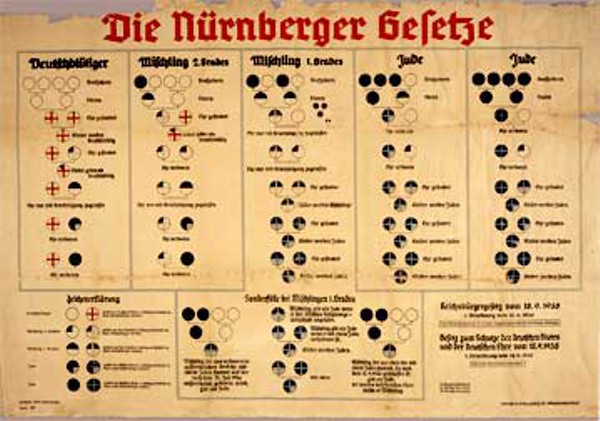 |
| Nuremberg laws |
During the annual convention of the National Socialist German Workers' Party (NSDAP) in Nuremberg on September 15, 1935, the "Nuremberg laws" were passed. This new legislation built the basis for the fascist policies of the Third Reich under Adolf Hitler that led to the extermination of Jews in the Holocaust.
The laws defined specifically who qualified as a German citizen and thus had the right to official state protection. The laws also clearly defined Jews as enemies of the state and as such stripped them of their rights of citizenship, marginalized them, and prepared for their succeeding mass extermination.
The first Nuremberg law, titled "The Law for the Protection of German Blood and German Honor," prohibited marriages and sexual relations between Germans and Jews and forbade the employment of German women under the age of 45 in Jewish households.
  |
It clearly stated a potential danger for fertile German women working in Jewish households. This cast the Jews as lustful beings with little control over their instincts. Jews were portrayed as dangerous to Germans. The first law was passed unanimously in the Reichstag and promulgated on September 16, 1935.
The second law, the so-called Reich Citizenship Law, clarified the relationship between German citizens and the state. It made clear that only Germans determined through blood counted as "nationals." As such, they were considered worthy of protection by the state, but they were also obliged to comply with the provisions that the state made for them.
The Reich only considered as citizens those who showed through their behavior that they were personally fit to serve the nation and were loyal to the state. The Reich Citizenship Law was further defined by the first supplementary of the law on November 14, 1935. It used the criterion of purity of blood to distinguish citizens from individuals of mixed Jewish blood and Jews.
The state granted the right of citizenship only to full-blooded Germans. Only they were allowed to vote and hold political offices. Jews were explicitly excluded from political participation, and Jews currently in political offices were ordered to retire by December 31, 1935.
The Nuremberg laws were soon followed by "The Law for the Protection of the Genetic Health of the German People," which required all persons wanting to marry to submit to a medical examination, after which a "Certificate of Fitness to Marry" would be issued if they were found to be free of disease. The certificate was required in order to get a marriage license.
The Nuremberg laws built the basis for the exclusion and later persecution of Jews in German society that eventually led to the Holocaust. The laws operated from the premise that Germans were the pinnacle of evolution and that the German blood pool was superior to that of all other races. As such, the NSDAP considered the protection of the pure German blood pool essential and wanted to ensure that German blood did not mix with that of other races.